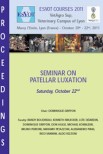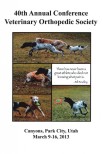A literature review identified six placebo-controlled studies of analgesics in client-owned cats with degenerative joint disease-associated pain. Five studies with 96 cats had available data. Caregiver responses on a clinical metrology instrument, Client-Specific Outcome Measure (CSOM), were compared to measured activity. Cats were categorised as 'successes' or 'failures' based on change in CSOM score and activity counts from baseline. Effect sizes based on CSOM score were calculated; factors that were associated with success/failure were analysed using logistic regression.
Effect sizes ranged from 0.97 to 1.93. The caregiver placebo effect was high, with 54-74 per cent of placebo-treated cats classified as CSOM successes compared with 10-63 per cent of cats classified as successes based on objectively measured activity. 36 per cent of CSOM successes were also activity successes, while 19 per cent of CSOM failures were activity successes. No significant effects of cat age, weight, baseline activity, radiographic score, orthopaedic pain score or study type on CSOM success in the placebo groups were found.
The caregiver placebo effect across these clinical trials was remarkably high, making demonstration of efficacy for an analgesic above a placebo difficult. Further work is needed to determine whether a potential placebo-by-proxy effect could benefit cats in clinical settings.
Caregiver placebo effect in analgesic clinical trials for cats with naturally occurring degenerative joint disease-associated pain
Journal
Gruen ME, Dorman DC, Lascelles BDX. Vet Rec. 2017 May 13; 180 (19): 473.









